Hanhui Yang
The NeurIPS 2022 Neural MMO Challenge: A Massively Multiagent Competition with Specialization and Trade
Nov 07, 2023



Abstract:In this paper, we present the results of the NeurIPS-2022 Neural MMO Challenge, which attracted 500 participants and received over 1,600 submissions. Like the previous IJCAI-2022 Neural MMO Challenge, it involved agents from 16 populations surviving in procedurally generated worlds by collecting resources and defeating opponents. This year's competition runs on the latest v1.6 Neural MMO, which introduces new equipment, combat, trading, and a better scoring system. These elements combine to pose additional robustness and generalization challenges not present in previous competitions. This paper summarizes the design and results of the challenge, explores the potential of this environment as a benchmark for learning methods, and presents some practical reinforcement learning training approaches for complex tasks with sparse rewards. Additionally, we have open-sourced our baselines, including environment wrappers, benchmarks, and visualization tools for future research.
Fast MRI Reconstruction via Edge Attention
Apr 22, 2023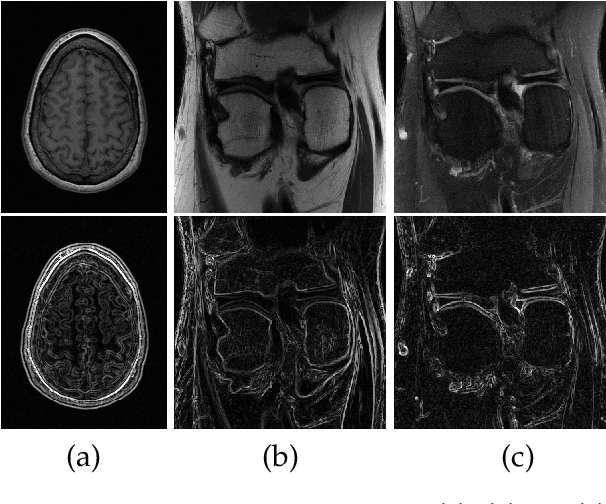


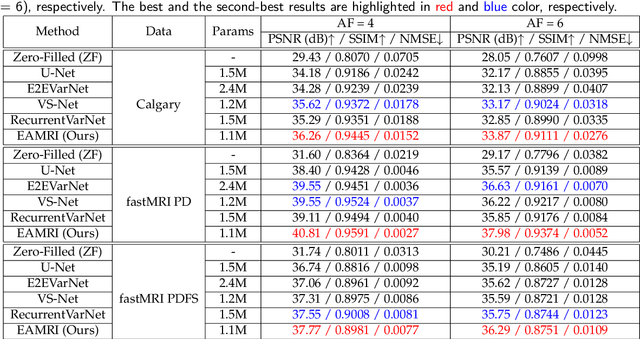
Abstract:Fast and accurate MRI reconstruction is a key concern in modern clinical practice. Recently, numerous Deep-Learning methods have been proposed for MRI reconstruction, however, they usually fail to reconstruct sharp details from the subsampled k-space data. To solve this problem, we propose a lightweight and accurate Edge Attention MRI Reconstruction Network (EAMRI) to reconstruct images with edge guidance. Specifically, we design an efficient Edge Prediction Network to directly predict accurate edges from the blurred image. Meanwhile, we propose a novel Edge Attention Module (EAM) to guide the image reconstruction utilizing the extracted edge priors, as inspired by the popular self-attention mechanism. EAM first projects the input image and edges into Q_image, K_edge, and V_image, respectively. Then EAM pairs the Q_image with K_edge along the channel dimension, such that 1) it can search globally for the high-frequency image features that are activated by the edge priors; 2) the overall computation burdens are largely reduced compared with the traditional spatial-wise attention. With the help of EAM, the predicted edge priors can effectively guide the model to reconstruct high-quality MR images with accurate edges. Extensive experiments show that our proposed EAMRI outperforms other methods with fewer parameters and can recover more accurate edges.
Multiple Degradation and Reconstruction Network for Single Image Denoising via Knowledge Distillation
Apr 29, 2022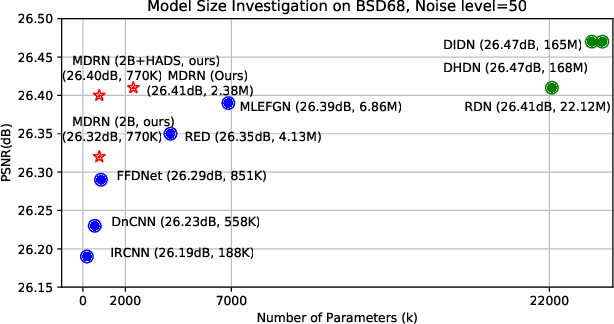

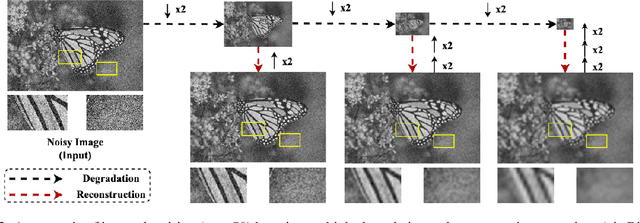

Abstract:Single image denoising (SID) has achieved significant breakthroughs with the development of deep learning. However, the proposed methods are often accompanied by plenty of parameters, which greatly limits their application scenarios. Different from previous works that blindly increase the depth of the network, we explore the degradation mechanism of the noisy image and propose a lightweight Multiple Degradation and Reconstruction Network (MDRN) to progressively remove noise. Meanwhile, we propose two novel Heterogeneous Knowledge Distillation Strategies (HMDS) to enable MDRN to learn richer and more accurate features from heterogeneous models, which make it possible to reconstruct higher-quality denoised images under extreme conditions. Extensive experiments show that our MDRN achieves favorable performance against other SID models with fewer parameters. Meanwhile, plenty of ablation studies demonstrate that the introduced HMDS can improve the performance of tiny models or the model under high noise levels, which is extremely useful for related applications.
 Add to Chrome
Add to Chrome Add to Firefox
Add to Firefox Add to Edge
Add to Edge